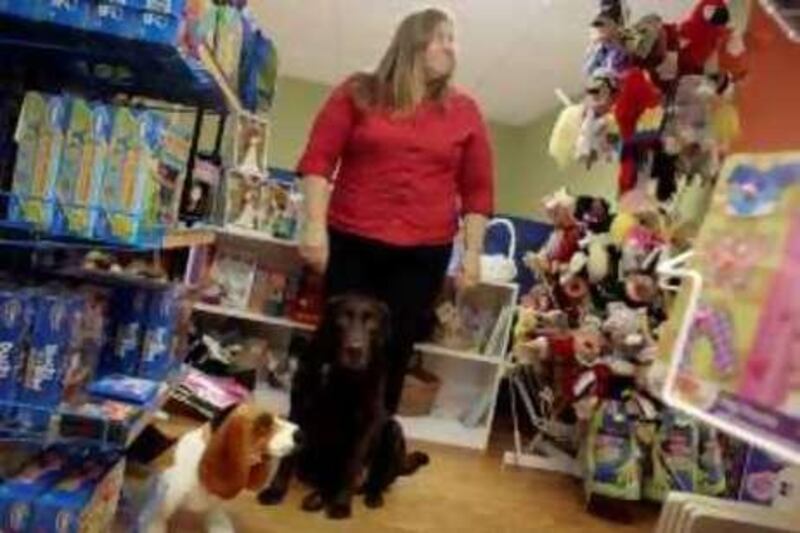PURCELLVILLE, VIRGINIA // The shop on Main Street, with its neatly stacked bottles, gourmet cheeses and glass case full of fancy chocolates, will soon be closing for business. People just are not interested in excesses these days and sales have dwindled. "People stopped going out and shopping; people stopped having parties," said Duane Harris, the owner of Purcellville Wine and Gourmet. "I don't think we're going to be able to make it." And while politicians on Capitol Hill - about 80 kilometres away - wrangle over a rescue effort worth $700 billion (Dh2.6 trillion) that they claim will help the Main Streets across America, Mr Harris said his shop will not be saved by the bailout. "I am not too big to fail, but I guess I am too small to save," he said. A politician rarely gives a speech about the financial crisis on Wall Street in which he or she can resist a reference or two to "Main Street", the rhetorically convenient and suddenly overused way to say "ordinary, small-town America". "There's too many Main Street enterprises and families who are at risk here," John McCain, the Republican presidential candidate, told ABC on Tuesday. Barack Obama, his Democratic rival, promises in a new television spot to "bring back our Main Streets all across America". Both candidates, and just about every other politician who is using the cliché, are hoping to strike a chord with US voters, many of whom still live in small towns centred on a commercial strip called Main Street. To some the mere mention of that place conjures the very image of the American Dream: a road lined with family-owned shops and US flags, a place where war veterans and beauty queens are cheered in parades. But to many, the American Dream is under threat, and they are looking to Capitol Hill for answers. "I'm definitely scared. There's no way they'll lend money to a small business like mine right now, with the credit crunch this tight. I'm just not gonna get it," said Richard Reed, a roofing contractor, as he emerged from a convenience store on Main Street in Round Hill, Virginia, a town of about 700 people that neighbours Purcellville. "If the rich guy, or upper middle class guy doesn't spend money on their roofing needs, we don't work." And about 70km away in the restored historic district of Manassas, Virginia, Christine Finnie, owner of a Main Street gift shop called the Whimsical Gallerie, said business had slowed to a trickle. "I only had half a dozen people come in my shop today ? the parking spaces have been pretty much empty," said Ms Finnie, whose business averaged about 40 to 50 daily shoppers last month. "Unless something drastic is done it's going to be a really poor season for the holidays this year." There is certainly no shortage of drastic plans. Members of Congress have been wrangling for days over how to conduct an unprecedented government intervention, which could give Henry Paulson, the treasury secretary and a former Wall Street executive, massive powers and funding to gobble up the soured assets of troubled banks. Both Mr McCain and Mr Obama support the rescue operation - which is based on a framework drawn up by the president - and have called on Congress to quickly find the courage to pass it. But many people on Main Street - who the plan is meant to protect - question why the government is so eager to pump money back into the coffers of the financiers who have been blamed for bringing on the meltdown in the first place. "I think they should just give it to all the taxpayers instead and let us spend the money to fix the economy," said Mr Reed, the roofer. "Don't bail Wall Street out - isolate them. They're the ones that screwed up, not us."
And a similar feeling seems to be prevailing in constituencies nationwide. Of the 36 House members facing highly competitive races in November, according to the Cook Political Report, a non-partisan newsletter, 28 voted down the measure. Mr McCain said on Tuesday politicians have simply failed to properly market the rescue effort to voters in small-town America, like Mr Reed. "We haven't convinced people that this is a rescue effort, not just for Wall Street but for Main Street America, for working families, for small businesses, the heartland of America - all over America," Mr McCain said on American Morning on CNN. But Barbara Robisheaux, over a plate of bacon and eggs at the Purcellville Family Restaurant on Main Street, said she understood the need for a government lifeline. "If they don't bail them out, more businesses are going to have to close and everything, and that's going to hurt Main Street in Purcellville," said Mrs Robisheaux, who does not work but said her stock investment has gone "southward". She added that she plans to give her grandchildren less money for Christmas because of the tough times. Not everyone, however, is ready to scale back. In Manassas, just off Main Street, Carmello's, an Italian restaurant, is expanding. Miguel Pires, who runs the place with his mother, said they will soon renovate a banquet room, create outdoor seating and add a new kitchen. No matter that business has been down about 10 per cent to 15 per cent or that the beauty salon next door recently went under. "The last 18 months have been pretty tough - it's the worst it's been in 10 years," Mr Pires said. But "we feel like things go in cycles and we are, you know, going to come out of this. So we're looking to expand because we feel this area is going to blow up in a couple of more years". Still, Mr Pires said the restaurant recently cut a full-time chef and employed other cost-saving measures, from eliminating expensive courses like lobster to offering more promotions to guests. "We made adjustments with our wine list, we cut some of the higher end stuff off because no one's buying $100 bottles," he said. "Basically we're catering to the fact that things are tough." And perhaps no one knows that better than Mr Harris, the wine shop owner whose business is collapsing. "I don't think [politicians] plan on doing anything for Main Street - they are just going to say that in an election year to get elected," he said. On Tuesday, Mr Harris was selling some of his store's equipment to Kenneth Wine, owner of the Hamilton General Store, about five kilometres away in Hamilton, Virginia, where Main Street turns into Colonial Highway. Mr Wine, though less worried about the economy, said he also does not believe the "Main Street" talk in Washington. "If my store closed tomorrow they wouldn't blink," he said. sstanek@thenational.ae






